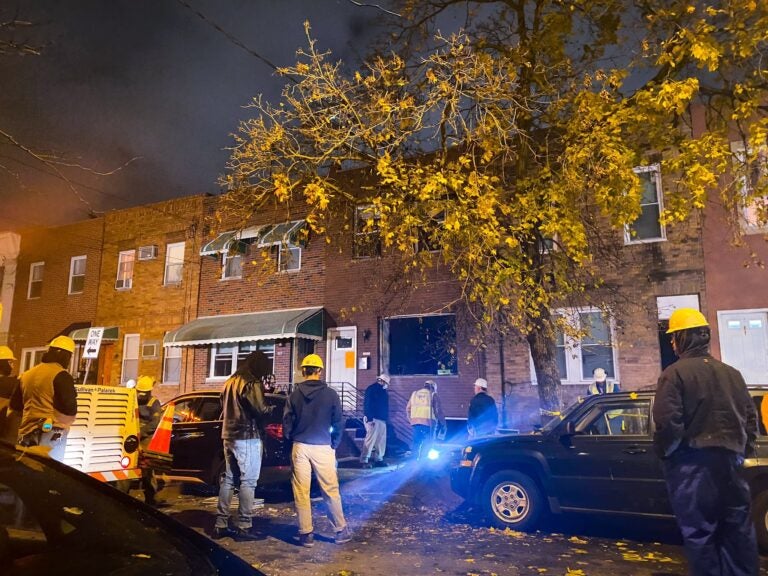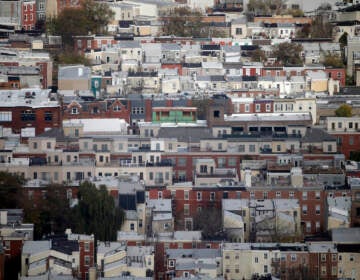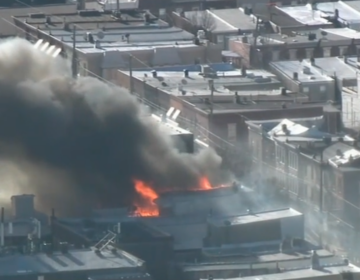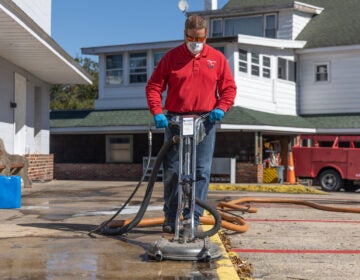PUC safety investigators claim PGW failed to prevent 2021 South Philly gas explosion
The explosion on Jackson Street in 2021 injured three people and caused several homes to be evacuated.
Listen 1:08
File - The scene after a gas explosion on the 800 block of Jackson Street in South Philadelphia in 2021. (George Solis/6abc)
Have a question about Philly’s neighborhoods or the systems that shape them? PlanPhilly reporters want to hear from you! Ask us a question or send us a story idea you think we should cover.
An investigation by the Pennsylvania Public Utility Commission’s safety division alleges Philadelphia Gas Works failed to take action that could have prevented a gas leak that caused an explosion that injured three people in South Philadelphia in 2021. They’re seeking a penalty of $300,000, changes to PGW’s safety protocols and a pilot project to monitor for methane leaks in 2,000 homes in the surrounding neighborhood.
A safety complaint filed late last month by the Pennsylvania Public Utility Commission’s independent Bureau of Investigation and Enforcement alleges PGW did not inspect a 4-inch cast-iron gas main after sewer repair work nearby undermined the surrounding soil — despite receiving notice of the excavation work. The pipe later cracked.
“Cast iron … is a really problematic pipe material,” said Bill Caram, director of the nonprofit Pipeline Safety Trust. “It’s frustrating to see this pipe still out there and still killing and injuring people.”
As of 2022, over half of PGW’s more than 3,000 miles of gas mains were considered “at-risk,” or made of cast iron or unprotected steel. Cast-iron mains grow brittle with age and account for a disproportionate share of gas distribution incidents. When the soil holding pipes in place becomes unstable, leaving them unsupported, pipes of any material are at high risk of developing cracks and failing.
A number of dangerous or deadly gas explosions have occurred in Philadelphia in recent years. In 2019, a leak from a more than 90-year-old PGW gas main in South Philly caused an explosion that killed two people and destroyed five rowhouses. In 2011, a young PGW worker died trying to patch a gas main break.
The Nov. 30, 2021 explosion at 815 Jackson St. caused six homes to be evacuated and over $100,000 in damage, according to the complaint.
Investigators claim PGW knew the gas main near 815 Jackson St. was threatened by unstable soil due to the PA One Call notices indicating excavations and sewer lateral issues — and still failed to investigate the pipe. They say the company violated its own procedures as well as the Pennsylvania Code and the Code of Federal Regulations.
The 800 block of Jackson Street had a history of gas main failures. The complaint lists five breaks of the utility’s mains between 2009 and 2018, despite PGW having told investigators it had no records of any “underground street troubles” on the block for 10 years prior to the explosion.
In the months leading up to the blast, two separate contractors excavated in front of 813 and 815 Jackson St. to repair sewer laterals. PGW was notified through the PA One Call system, which requires owners of underground infrastructure to mark the locations to ensure excavators know of any potential issues. This work on the sewer lines, which can undermine gas pipelines’ stability and indicate potential soil erosion, should have tipped off PGW to potential issues, according to the complaint.
While PGW did mark the location of their gas lines, best practices for gas distribution utilities to protect their pipes from damage during excavations also include observing excavation work while it’s happening and inspecting work after it’s finished to make sure it hasn’t affected the gas pipes, Caram said.
Prosecutors with the Bureau of Investigation and Enforcement are asking the PUC commissioners to approve a penalty against PGW of $300,000 and to order the company to take action to prevent similar accidents in the future, including by speeding up replacement of old gas mains throughout Philadelphia. The company was recently awarded $125 million in federal grants to replace 66 miles of aging cast-iron pipes. PGW currently estimates that it will take until 2058 to replace all of its cast-iron pipelines.
Bureau of Investigation and Enforcement officials also want PGW to:
- Offer training to the Philadelphia Water Department and contractors around the requirements of PA One Call and how to protect underground infrastructure
- Require its employees investigate cast-iron mains when they observe conditions that could indicate unstable soil nearby
- Examine gas pipes of any material when employees receive notice or observe that they have been exposed
- Pilot “smart, remote methane detectors” to identify potential leaks for around 2,000 customers served by cast-iron mains in the vicinity of the 2021 explosion, then expand the program throughout PGW’s service area within five years
The Pipeline Safety Trust hopes to see in-home methane detectors eventually be required like smoke detectors. Even without requirements, gas companies can install them voluntarily, Caram said.
“It would save so many lives,” he said.
PGW can contest the investigators’ claims and proposed penalty before the PUC makes a final determination on the matter.
In response to the complaint, PGW spokesperson Dan Gross did not directly address the allegations against the company, but said in a written statement that safety is PGW’s “number one priority,” while implying the utility was not at fault.
“While the proposed penalties would unfairly penalize PGW’s ratepayers for the failures of others, this filing reinforces the importance of hiring licensed, well trained, and qualified plumbing contractors,” Gross said.
It’s unclear how the penalty will be passed on to ratepayers since the complaint says the proposed penalty “shall not be … passed through as an additional charge to PGW customers in Pennsylvania.”
Gross also pointed the finger at the plumbing contractors, which are not under the jurisdiction of the PUC.
“Poorly performed plumbing work can introduce a host of potential risks to the public that are difficult to detect once the underground worksite is covered and paved,” Gross said.
The two sewer contractors named in the complaint — Lepore Plumbing and Clements Brothers and Sister, Inc. — both appear to have active licenses from the city, according to the city’s online Contractor Lookup tool.
Richard Lepore, the plumbing contractor who replaced the sewer lateral curb trap and vent at 813 Jackson St. nearly three months prior to the explosion, said he found no evidence of a leak from the sewer lateral or broader soil stability issues when he dug his hole. He said tree roots had caused a backup in the curb trap and vent, and that his excavation did not expose the gas pipe. The complaint did not describe any wrongdoing by Lepore.
“There’s guys out there doing poor jobs. They’re not lying about that,” Lepore said. “But the guys that are doing the right work, doing the right job, and working by all the guidelines that are in place — it’s unfair to them when something happens and you can’t even defend yourself.”
Lepore’s company was also named alongside PGW in a suit filed by the family of one of two people who died in the 2019 gas explosion in South Philly. Lepore said his work did not play any role in that blast.
The PUC’s Bureau of Investigation and Enforcement also filed a safety complaint against PGW over the 2019 explosion, alleging the company failed to adequately protect a 6-inch cast-iron pipeline, despite having knowledge that support for the segment of buried pipe had been disturbed by excavation activity nearby. PGW denied all the alleged violations. That complaint is still in litigation, according to PUC spokesperson Nils Hagen-Frederiksen.
 This story is a part of Every Voice, Every Vote, a collaborative project managed by The Lenfest Institute for Journalism. The William Penn Foundation provides lead support for Every Voice, Every Vote in 2024 and 2025 with additional funding from The Lenfest Institute for Journalism, Comcast NBC Universal, The John S. and James L. Knight Foundation, Henry L. Kimelman Family Foundation, Judy and Peter Leone, Arctos Foundation, Wyncote Foundation, 25th Century Foundation, and Dolfinger-McMahon Foundation.
This story is a part of Every Voice, Every Vote, a collaborative project managed by The Lenfest Institute for Journalism. The William Penn Foundation provides lead support for Every Voice, Every Vote in 2024 and 2025 with additional funding from The Lenfest Institute for Journalism, Comcast NBC Universal, The John S. and James L. Knight Foundation, Henry L. Kimelman Family Foundation, Judy and Peter Leone, Arctos Foundation, Wyncote Foundation, 25th Century Foundation, and Dolfinger-McMahon Foundation.
To learn more about the project and view a full list of supporters, visit www.everyvoice-everyvote.org. Editorial content is created independently of the project’s donors.
WHYY is your source for fact-based, in-depth journalism and information. As a nonprofit organization, we rely on financial support from readers like you. Please give today.










